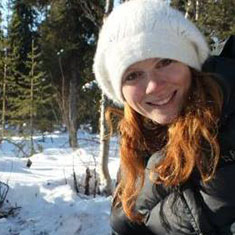Dr. Julia Newth
Ecosystem Health & Social Dimensions Manager
Honorary Lecturer at the University of Exeter
Co-Chair of the global WI-IUCN Swan Specialist Group
Contact details

About me
My life-long fascination with the natural world and how we interact with it led me to undertake a degree in Geography at the University of Southampton. Enjoying the sciences and the arts in equal measure, the course enabled me to indulge in a variety of disciplines from social science to oceanography. My PhD with the University of Exeter and WWT used inter-disciplinary methods from ecology, the social sciences and psychology to understand the biological effects and human conflict relating to lead poisoning and illegal hunting of migratory waterbirds.
My role
I oversee the work of WWT’s Ecosystem Health and Social Dimensions Unit. We use a range of methods from the fields of social science, psychology and ecology to build evidence that informs and encourages wetland conservation. Priorities include capturing the social, cultural & wellbeing benefits of wetlands for people and communities, understanding and encouraging human behaviours that support wetland conservation and examining drivers and providing solutions for issues that impact on the health of wetland ecosystems. We engage with a range of stakeholders to bridge research, policy and public platforms so that the impact of our evidence is maximised. Our work also involves promoting the importance of wetlands and their wildlife in national and international media and using other creative influencing tools.
In 2016, I helped maximise the conservation benefits of Flight of the Swans by supporting and co-ordinating more than 40 conservation activities across 11 countries, and have participated and led numerous expeditions to Iceland and the Russian Arctic. I have a deep understanding of approaches to mitigate and resolve conservation conflicts and lead our work to tackle lead ammunition poisoning and the illegal hunting of Bewick’s swans in Russia (through a community-led initiative known as the Swan Champions project).
Experience and interests
- Project management from project conception to completion, including design, planning, implementation, budget management, risk management, contractual agreements and reporting.
- Data analysis (quantitative and qualitative). Proficient in R and other statistical packages.
- Social & ecological data collection and management involving survey work in remote and demanding locations and managing long-term datasets.
- Stakeholder/community engagement and participatory techniques.
- Teaching & supervision: Co-supervision of PhD candidate Emily Strong who is studying at the University of Exeter and guest lecturer on MSc and undergrad courses.
- Communication to a variety of audiences (academics, policy makers, communities and the general public). Previous platforms include the Royal Geographic Society, the European Parliament, the Council of Europe, the Arctic Biodiversity Congress and community group meetings.
- Media trained and frequent interviewee - I’m always happy to shout about our work! Previous interviews include Radio 4’s Today Programme and Saturday Live, BBC Breakfast and BBC Autumnwatch.
Publications
Newth, J.L., McDonald, R.A., Wood, K.A., Rees, E.C., Semenov, I., Chistyakov, A., Mikhaylova, G., Bearhop, S., Cromie, R.L., Belousova, A., Glazov, P. & Nuno, A. In Press. Predicting intention to hunt protected wildlife: a case study of Bewick’s swans in the European Russian Arctic. Oryx.
Brittain, S., Ibbett, H., de Lange, E., Dorward, L., Hoyte, S., Marino, A., Milner-Gulland, E.J., Newth, J., Rakotonarivo, S., Verissimo, D. & Lewis, J. 2020. Ethical considerations when conservation research involves people. Conservation Biology, doi.org/10.1111/cobi.13464
Newth, J.L., Wood, K.A., McDonald, R.A., Nuno, A., Semenov, I., Chistyakov, A., Mikhaylova, G., Bearhop, S., Belousova, A., Glazov, P., Cromie, R.L. & Rees, E.C. 2019a. Conservation implications of misidentification and killing of protected species. Conservation Science and Practice, doi: 10.1111/csp2.24
Newth J.L., Lawrence, A., Cromie, R.L., Swift, J.A., Rees, E.C., Wood, K.A., Strong, E.A., Reeves, J. & McDonald, R.A. 2019b. Perspectives of ammunition users on the use of lead ammunition and its potential impacts on wildlife and humans. People and Nature, doi: 10.1002/pan3.30
Newth, J.L., Rees, E.C., Cromie, R.L., McDonald, R.A., Bearhop, S., Pain, D.J., Norton, G.J., Deacon, C., Hilton, G.M. 2016. Widespread exposure to lead affects the body condition of free-living whooper swans Cygnus Cygnus wintering in Britain. Environmental Pollution 209: 60–67.
Newth, J.L., Cromie, R. & Kanstrup, N. 2015. Lead shot in Europe: conflict between hunters and conservationists. In: Redpath, S.M., Gutierrez, R.J., Wood, K.A. & Young, J.C. (eds) Conflicts in Conservation: Navigating towards solutions. Cambridge University Press, Cambridge, pp. 177–179.
Newth, J.L., Cromie, R.L., Brown, M.J., Delahay, R.J., Meharg A.A., Deacon, C., Norton, G. J., O’Brien, M.F. & Pain, D.J. 2012. Poisoning from lead gunshot: still a threat to wild waterbirds in Britain. European Journal of Wildlife Research 59: 195–204.
Newth, J.L., Brown, M.J. & Rees, E.C. 2011. Incident of embedded shotgun pellets in Bewick’s Swans Cygnus columbianus bewickii and Whooper Swans Cygnus cygnus wintering in the UK. Biological Conservation 144: 1630–1637.
Return to meet the team